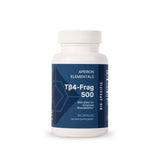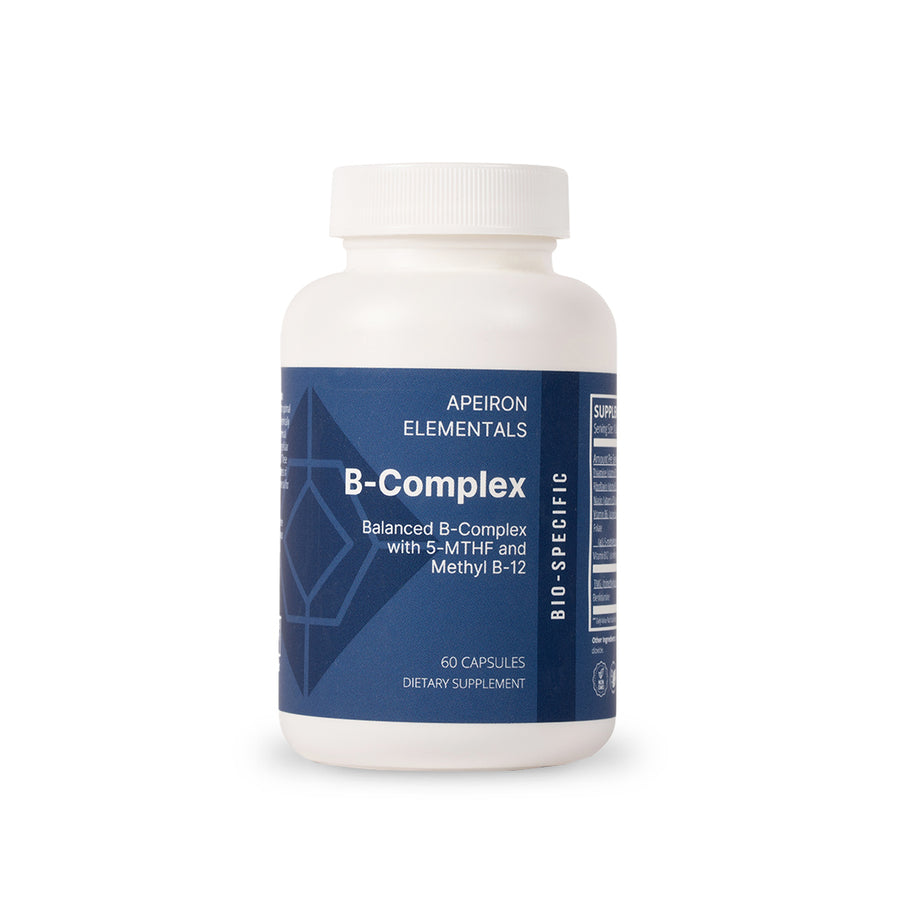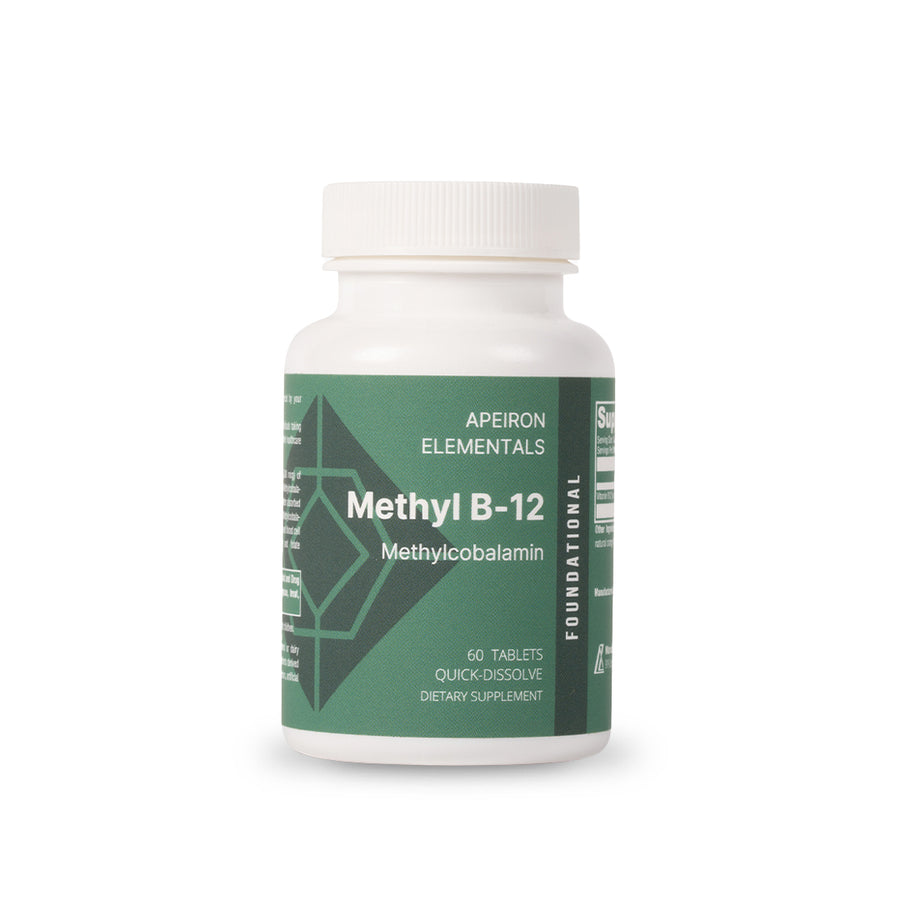
Cognitive health is becoming a greater priority for people of all ages, and many are now turning to the benefits of B complex for brain function. This group of essential B vitamins plays a big role in mental clarity, memory retention, and energy metabolism.
Although often discussed in the context of general wellness, their impact on cognitive performance, stress resilience, and focus is both profound and widely studied.
The human brain is a demanding organ. It consumes about 20% of the body’s energy, even at rest. To keep up with that demand, it relies on nutrients that support energy conversion, neurotransmitter activity, and blood flow. The B-vitamin family supports each of these functions.
Without them, fatigue, fogginess, or low mood may start to interfere with daily thinking. Over time, chronic deficiency can impact memory and reduce a person’s ability to remain mentally engaged. Knowing how each B vitamin works gives clearer insight into their value for long-term cognitive support.
The Brain’s Need for B Vitamins
Every B vitamin has a different job to do in brain function. Collectively, they support the production of neurotransmitters, stabilize energy cycles within brain cells, and influence how we manage stress.
These nutrients work together to keep the brain alert and balanced. When one or more of them is missing, symptoms like forgetfulness, low motivation, or mental fatigue may appear.
B vitamins help convert the carbohydrates and proteins we eat into usable fuel for neurons. This is important because neurons cannot store energy. They need a constant supply to carry out even the most basic functions.
B vitamins also support the formation of neurotransmitters like serotonin, dopamine, and acetylcholine. These chemical messengers affect everything from mood to memory retrieval. Without enough of these building blocks, the brain begins to slow down in noticeable ways.
How Vitamin B1 (Thiamine Benfotiamine) Supports Mental Stamina
Thiamine, also known as vitamin B1, helps convert glucose into energy. Since glucose is the brain’s main energy source, this conversion is important for mental performance.
Thiamine does not store well in the body. It needs to be replenished regularly to keep brain cells energized.
When thiamine levels drop, the brain begins to show signs of fatigue. People may find it harder to stay awake, process new information, or focus on a task. In more extreme cases, a lack of B1 can affect coordination and memory.
Mental stamina depends on steady energy, and thiamine is effective in that equation. It also helps regulate mood through its influence on neurotransmitter activity. Without it, emotional balance may start to feel unstable.
Befotiamine is a synthetic, lipid-soluble derivative of thiamine. While both compounds ultimately support similar metabolic functions, benfotiamine offers several distinct advantages, including better bioavailability and pronounced antioxidant/anti-inflammatory properties.
Vitamin B2 (Riboflavin) and Cellular Energy
Riboflavin, or vitamin B2, contributes to mitochondrial function in brain cells. Mitochondria are responsible for generating the energy needed for thought, concentration, and alertness. Riboflavin also supports the body’s antioxidant systems, which help reduce oxidative stress in brain tissue.
When mitochondria operate efficiently, the brain can maintain better clarity and memory. This is why riboflavin is often included in advanced vitamin B-complex formulations. It fuels the internal machinery of neurons.
If this system becomes sluggish, the effects can include poor memory recall or general mental tiredness. Since riboflavin is water-soluble, it needs to be consumed daily to maintain consistent levels in the body.
Vitamin B3 (as Niacinamide) and Neuroprotection
Niacin, or vitamin B3, has a reputation for supporting circulation and heart health, but its role in brain function is equally important. It helps form NAD, a coenzyme involved in energy transfer within brain cells. Without enough NAD, neurons cannot function properly.
This affects both short-term and long-term brain performance.
Niacin also comes into play in neuroprotection. It helps protect brain cells from oxidative stress and supports the repair of DNA. These processes are imperative for maintaining brain health over time.
A 2013 review published in the Journal of Clinical Nutrition found that niacin intake was associated with reduced rates of age-related cognitive decline in older adults. In the short term, its assistance in fuel metabolism helps support better mental endurance and clarity.
This makes it a valuable part of any brain-focused supplement.
Vitamin B5 (Pantothenic Acid) and Focus
Pantothenic acid, or vitamin B5, is best known for its part in synthesizing coenzyme A. This compound is involved in hundreds of enzymatic reactions, including the creation of acetylcholine, a neurotransmitter essential for memory and attention.
Acetylcholine is often called the "learning neurotransmitter" because it supports focus, retention, and decision-making.
When the body lacks B5, the production of acetylcholine may slow down. This can lead to poor concentration, slow response time, or forgetfulness. These symptoms are often attributed to fatigue or stress, but they may reflect a nutritional gap.
B5 works in tandem with other B vitamins to support staying focused during complex mental tasks. It also helps support healthy adrenal function, which ties into how the body manages stress.
Vitamin B6 and Neurotransmitter Synthesis
Vitamin B6 is deeply involved in the production of neurotransmitters such as serotonin, dopamine, GABA, and norepinephrine. Each of these chemicals is instrumental in emotional regulation, concentration, and overall mental resilience.
When B6 is low, the brain may struggle to maintain these systems. This can result in mood swings, irritability, or brain fog.
Beyond neurotransmitter activity, B6 is involved in regulating homocysteine levels. Elevated homocysteine is associated with a greater risk of cognitive decline. B6 helps keep this compound in check, which supports both short-term focus and long-term brain health.
It also matters in how the body responds to stress. Adequate B6 levels may help reduce stress reactivity by supporting healthy cortisol rhythms. These combined roles make it a contributor to cognitive function, especially for those dealing with mental fatigue or information overload.
B7 (Biotin): Often Overlooked, Still Vital
Biotin, also known as vitamin B7, is frequently mentioned in conversations about hair and skin. However, its influence on brain function is far more complex than its popularity in beauty supplements suggests.
Biotin plays a major role in the metabolism of glucose, which is the primary energy source for the brain.
Without a steady flow of energy, neurons cannot function efficiently. Biotin assists in converting nutrients into fuel. This process supports mental alertness throughout the day.
It also helps regulate nerve signals by contributing to the formation of myelin. Myelin is the protective sheath that surrounds nerve fibers and promotes smooth signal transmission. When myelin becomes damaged or weak, neurological communication slows down.
This can show up as forgetfulness, mental fatigue, or lack of focus.
Though biotin deficiencies are rare, suboptimal levels can still impact cognitive performance. For this reason, it belongs in a well-balanced vitamin B-complex aimed at brain support.
Vitamin B9 (as 5-MTHF) and Cognitive Sharpness
5-MTHF (5-Methyltetrahydrofolate) is the biologically active form of vitamin B9 (folate) used by your body. Folate assists in brain development and adult cognitive health. It is involved in the synthesis of DNA and neurotransmitters. These functions impact how we process information, retain memories, and adapt to new mental tasks.
Folate also helps regulate homocysteine, an amino acid that, when elevated, has been linked to cognitive decline and mood instability.
According to a study from the University of Oxford in 2010, adults who took B vitamins including folate experienced slower brain shrinkage in regions associated with Alzheimer’s disease. Low levels of folate are associated with slower processing speeds and decreased memory function.
Its impact can be especially important in older adults or anyone experiencing increased mental demands. Folate works alongside B6 and B12 in a trio that supports neurological resilience. This makes it an important nutrient for maintaining cognitive sharpness over time.
Including folate in a daily supplement may help protect against changes in memory and learning ability. It also supports overall brain structure by assisting in cellular repair and growth.
Vitamin B12 and Memory Retention
Among all the B vitamins, B12 may be the most widely discussed when it comes to cognitive support. Its influence on memory is deeply tied to its role in producing myelin. This protective sheath keeps neurons firing efficiently.
When B12 levels drop, communication between brain cells weakens. This often leads to short-term memory lapses, mood shifts, or mental fatigue.
B12 is also needed for the production of red blood cells, which help transport oxygen to the brain. Without oxygen-rich blood, brain tissues struggle to remain active and alert. A B12 deficiency can show up as low energy, foggy thinking, or difficulty with concentration.
These symptoms are frequently mistaken for stress or aging. Supplementing with B12 may help reverse or reduce these effects. It is especially important for those following plant-based diets, as B12 is found primarily in animal products.
Including B12 in a high-quality B complex for brain function supports both short-term mental clarity and long-term cognitive resilience.
TMG (Trimethylglycine, also called betaine) and Available Methyl Groups
Among methylation-supporting compounds, TMG (Trimethylglycine, also called betaine) is gaining attention for its impact on cognitive function and memory. Its core mechanism is donating methyl groups—critical for processes like DNA repair, neurotransmitter synthesis, and protection against oxidative stress.
When methylation is suboptimal, as seen in certain genetic variations (like MTHFR polymorphisms), the brain’s ability to process information and retain memories can decline. Supporting methylation with TMG helps normalize homocysteine levels, lowering risks for neurodegeneration and improving cognitive resilience.
Symptoms of methylation deficiency—poor memory, confusion, low energy, or mood changes—may be mistaken for normal aging or stress. Supplementing with TMG can reduce these effects, especially for those with impaired methylation (including MTHFR variants), neurodegenerative risk, or homocystinuria.
Including TMG in a comprehensive methylation-support protocol supports both immediate mental sharpness and long-term retention, making it an increasingly recommended option for safeguarding brain health with age.
Managing Stress and Preventing Burnout
Stress is one of the biggest obstacles to maintaining focus and mental performance. When stress becomes prolonged, cortisol levels rise. High cortisol can interfere with memory formation, sleep quality, and mood regulation.
B-complex vitamins help buffer this reaction by supporting adrenal gland function. These glands are responsible for releasing hormones that regulate how we respond to stress.
Several B vitamins, especially B5 and B6, are involved in maintaining hormonal balance during stressful periods. They help the body produce calming neurotransmitters like serotonin and GABA. When these systems are supported, people are more likely to remain calm and composed under pressure.
This can reduce the mental fog that often accompanies burnout. By helping to reduce stress, B vitamins also protect the brain from the long-term impact of elevated cortisol.
This is why B-complex supplements are often recommended for people dealing with anxiety, overwork, or lack of sleep. They offer nutritional support that helps restore mental equilibrium.
Combating Brain Fog with the Right Nutrients
Brain fog is a vague but frustrating experience. It may feel like mental sluggishness, forgetfulness, or a lack of clarity. It interferes with everything from productivity to daily conversation.
Many of the symptoms stem from poor nutrient availability, stress, or impaired neurotransmitter activity. A well-formulated B complex for brain fog can help deal with the underlying causes of this condition.
B vitamins support these systems by fueling energy metabolism and stabilizing chemical messaging in the brain. For example, B6 influences dopamine levels. This helps maintain motivation and cognitive alertness.
Thiamine supports glucose metabolism, which fuels the brain. Folate and B12 protect against neural damage and help repair cell structures. When these processes function together, the brain can maintain better rhythm and speed.
It is important to tackle brain fog not just with lifestyle changes but also with targeted nutrients. B-complex supplements that focus on cognitive health may bring sharper thinking and steadier focus without relying on stimulants. They work with the body’s natural chemistry instead of overriding it.
B Complex for Long-Term Cognitive Health
Long-term cognitive health involves preserving memory, focus, and mental agility as we age. This does not happen by accident. It requires support for the brain’s energy systems, cell structures, and chemical messengers.
The B-vitamin family addresses each of these areas. A 2013 meta-analysis published in Psychopharmacology reviewed several randomized trials and found that B-complex vitamins may improve cognitive performance and reduce stress-related symptoms in healthy adults.
One area of study focuses on homocysteine reduction. Elevated homocysteine has been linked to memory loss and cognitive risk.
B6, B9, and B12 help convert homocysteine into less harmful substances. This supports vascular health and protects brain tissue.
Researchers at the University of Oxford (Smith et al., 2010) also found that daily B vitamin supplementation slowed brain atrophy in individuals with mild cognitive impairment. Other studies have shown that supplementing with B-complex may help preserve the size of certain brain regions associated with memory.
Cognitive health is not just about sharp thinking today. It is about staying mentally resilient across decades. A targeted vitamin B-complex can support this goal by reinforcing the brain’s foundational systems.
Regular intake of these nutrients, especially when guided by individual needs or a physician’s advice, may support long-term mental clarity.
Why We Formulate Our B Complex with Cognitive Support in Mind
At Apeiron Elementals, we know that your brain is an invaluable tool. It shapes your decisions, memories, and daily experiences.
That is why we created our vitamin B-complex with cognitive support in mind. We did not stop at covering daily requirements.
Instead, we selected each ingredient based on how it contributes to mental stamina, mood balance, and stress resilience.
Our formula is structured to support your energy levels without the use of synthetic stimulants. It includes B1 through B12 in balanced doses, with attention to bioavailability. That means your body can absorb and use what it receives.
We know that today’s challenges demand focus, flexibility, and emotional steadiness. Our B-complex was developed to support those qualities from the inside out.
We focus on high-quality, physician-recommended supplements. Our products are made for people who want more than general wellness. They are for those who need specific tools to address mental fatigue, concentration, or emotional balance.
Whether you are experiencing brain fog or simply want to stay mentally sharp, our B-complex is designed to support your goals.
If you have any questions about Apeiron Elementals, feel free to reach out. We are here to help you explore smart, science-backed solutions that support real outcomes in brain health and beyond.
Apeiron Insight Hub
Evidence-based guides for optimal performance and healthspan.






























